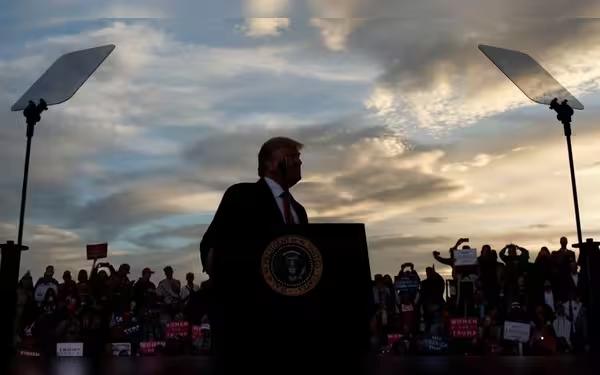Saturday, November 16, 2024 05:27 PM
Trump's Role in Addressing the Climate Crisis
- Trump's return raises climate action questions.
- Severe weather events impact voter turnout.
- EPA's role in regulating emissions is crucial.
 Image Credits: asiatimes
Image Credits: asiatimesAs Trump returns to power, the urgency of addressing the climate crisis intensifies amid severe weather events and political shifts.
The climate crisis is a pressing issue that affects everyone on the planet. As the world grapples with rising temperatures and extreme weather events, the role of political leaders becomes crucial. Donald Trump, who is set to return to power, will lead the United States, the largest historical emitter of greenhouse gases. This situation raises questions about what he can do to address the climate crisis and what limitations he may face.
During the recent election cycle, neither Trump nor his opponent, Kamala Harris, made the climate crisis a central theme of their campaigns. This is surprising, especially considering that the United States has been battered by severe weather disasters. For instance, Hurricane Helene, which struck in late September, was intensified by unusually warm waters in the Atlantic Ocean, resulting in the tragic loss of 232 lives across the southeastern United States. Notably, North Carolina, a key swing state that supported Trump, experienced significant devastation. Many voters in the western part of the state faced challenges in casting their ballots due to the lack of polling stations, forcing them to vote in makeshift tents.
Scientists warn that the Earth is precariously balanced. The Amazon rainforest, often referred to as the "lungs of the planet," is drying out, and a crucial North Atlantic current that helps regulate ocean temperatures is slowing down. If either of these systems were to collapse, the consequences for the climate could be catastrophic, leading to even more severe weather patterns and environmental instability.
The recent elections also highlighted a shift in political power, particularly in America’s former manufacturing heartland, known as the "Rust Belt." This region, which once formed the Democratic Party's stronghold, has seen a decline in support for the party. The historical context is significant; in 1969, a river polluted with industrial waste caught fire, leading to a wave of federal regulations and the establishment of the Environmental Protection Agency (EPA) under the Nixon administration. The EPA plays a vital role in regulating climate pollution, setting rules to limit emissions from power plants and vehicles, which are two of the largest sources of carbon dioxide in the country.
As Trump prepares to take office again, the question remains: what can he realistically do to combat the climate crisis? While he has the power to influence policies and regulations, the challenges are immense. The need for a comprehensive approach to climate change is more urgent than ever. It is essential for leaders to prioritize environmental issues, not just for the sake of the planet but for the well-being of future generations. The choices made today will shape the world of tomorrow, and it is crucial that all stakeholders, including citizens, hold their leaders accountable for taking meaningful action against climate change.













